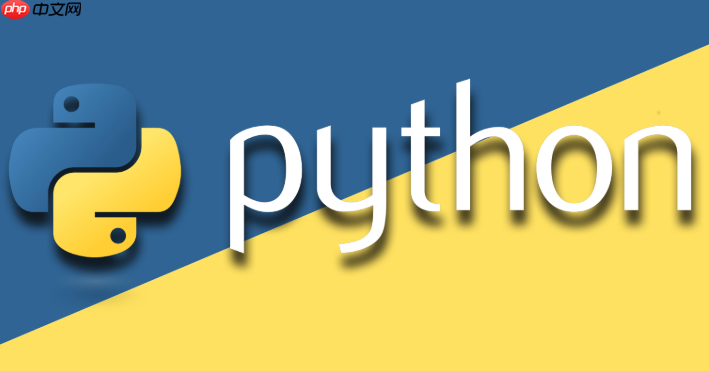new 方法的核心角色是创建并返回类的实例,控制对象的创建过程。它在实例化时先于 init 被调用,负责内存分配与实例生成,决定对象的类型,可实现单例、不可变对象等高级模式。

在Python的面向对象编程中,
__new__和
__init__方法是对象生命周期中两个至关重要的阶段,它们的核心区别在于:
__new__负责“创造”一个实例,也就是在内存中分配空间并返回这个新的对象;而
__init__则负责“初始化”这个已经创建好的实例,为它的属性设置初始值。简单来说,
__new__是造物主,
__init__是装修师。
面向对象编程中,当我们通过
ClassName()这样的方式来实例化一个对象时,背后其实经历了一个两阶段的过程。首先,Python会调用类的
__new__方法来创建一个新的对象。这个方法是一个类方法(尽管它不需要使用
@classmethod装饰器,它接收的第一个参数是
cls,代表当前正在被实例化的类)。它的主要职责就是分配内存,并返回一个该类的实例。如果这个方法没有返回一个该类的实例,那么
__init__方法就不会被调用。
一旦
__new__方法成功返回了一个新的实例,Python接下来就会调用这个实例的
__init__方法。
__init__方法是一个实例方法,它接收的第一个参数是
self,即刚刚由
__new__创建出来的那个实例。它的任务就是接收构造函数传入的参数,并用这些参数来设置
self对象的属性,完成对象的初始化工作。
打个比方,
__new__就像是工厂里生产出了一辆汽车的骨架和外壳,它决定了这辆车“是”一辆车。而
__init__则是给这辆车装上座椅、发动机、方向盘,并喷漆,让它成为一辆“特定配置”的汽车。
class MyClass:
def __new__(cls, *args, **kwargs):
print("--- __new__ 方法被调用 ---")
# 通常这里会调用父类的 __new__ 方法来实际创建实例
instance = super().__new__(cls)
print(f"--- __new__ 创建了实例: {instance} ---")
return instance
def __init__(self, name):
print("--- __init__ 方法被调用 ---")
self.name = name
print(f"--- __init__ 初始化了实例 {self},名称为: {self.name} ---")
# 实例化一个对象
obj = MyClass("Python")
print(f"最终对象: {obj}, 名称: {obj.name}")从输出中可以清晰地看到
__new__总是先于
__init__执行。
__new__
方法在 Python 对象创建中扮演的核心角色是什么?
在我看来,
__new__方法在Python的对象创建机制中扮演了一个“工厂负责人”的角色,它的核心职责在于控制实例的创建过程。这个方法是真正意义上决定一个对象“如何诞生”的地方。当一个类被调用来创建实例时,
__new__是第一个被触及的特殊方法。它接收的第一个参数是
cls,也就是当前正在被实例化的类本身,这和
__init__接收
self(已创建的实例)有本质区别。
__new__的主要任务包括:
-
分配内存并返回实例: 它的首要工作是在内存中为新对象分配空间。通常,我们会通过
super().__new__(cls)
来调用父类的__new__
方法来完成这个任务,这确保了对象能被正确地创建。如果__new__
没有显式地返回一个实例,那么__init__
就不会被调用。 -
决定实例的类型: 这是一个非常强大的特性。
__new__
方法不一定非要返回cls
类型的实例。它可以返回一个完全不同类型的对象,甚至是已经存在的对象。这意味着你可以在对象创建的最初阶段就介入,改变最终实例的类型,或者返回一个缓存中的实例。 -
实现单例模式等高级创建模式: 正是由于
__new__
可以在返回实例之前进行逻辑判断,它成为了实现单例模式(Singleton)的理想场所。我们可以在__new__
中检查是否已经存在一个实例,如果存在就直接返回那个实例,而不是创建新的。
说白了,如果你想在对象被真正“出生”之前做一些事情,或者想控制对象的“出生方式”,那么
__new__就是你唯一的入口。
class Singleton:
_instance = None # 用于存储单例实例
def __new__(cls, *args, **kwargs):
if cls._instance is None:
print("--- 首次创建单例实例 ---")
cls._instance = super().__new__(cls)
else:
print("--- 返回已存在的单例实例 ---")
return cls._instance
def __init__(self, name):
# 注意:__init__ 每次都会被调用,所以这里需要一些判断
# 或者确保 __init__ 是幂等的
if not hasattr(self, '_initialized'): # 避免重复初始化
print(f"--- 初始化单例实例: {name} ---")
self.name = name
self._initialized = True
else:
print(f"--- 单例实例已初始化,跳过重复初始化: {name} ---")
s1 = Singleton("InstanceOne")
print(f"s1 的名称: {s1.name}, ID: {id(s1)}")
s2 = Singleton("InstanceTwo") # 此时 __init__ 也会被调用,但 __new__ 返回的是s1
print(f"s2 的名称: {s2.name}, ID: {id(s2)}")
s3 = Singleton("InstanceThree")
print(f"s3 的名称: {s3.name}, ID: {id(s3)}")
print(f"s1 is s2: {s1 is s2}")
print(f"s1 is s3: {s1 is s3}")这个例子清楚地展示了
__new__如何控制了实例的唯一性,而
__init__即使被多次调用,也可以通过内部逻辑避免重复初始化属性。
__init__
方法如何确保新对象的属性得到正确初始化?
__init__方法,顾名思义,是“初始化器”。它在
__new__方法创建并返回了一个新实例之后被调用,其核心职责就是确保这个新对象的内部状态(即属性)被正确地设置和初始化。它接收的第一个参数是
self,这个
self就是
__new__方法刚刚创建并返回的那个实例。
__init__的工作流程通常包括:
-
接收构造参数:
__init__
方法接收用户在实例化对象时传入的所有参数(除了self
)。这些参数通常用于设置对象的初始状态。 -
设置实例属性: 在
__init__
内部,我们会使用这些参数来创建并赋值给实例的属性。例如,self.name = name
,self.age = age
等。这是最常见也是最重要的用途。 -
执行其他初始化逻辑: 除了设置属性,
__init__
还可以执行任何其他必要的初始化操作,比如打开文件、建立数据库连接、调用其他方法来计算初始值等。这些操作都围绕着“让这个新创建的对象进入一个可用状态”这个目标。 -
调用父类初始化器: 在继承体系中,为了确保父类的属性也能被正确初始化,我们通常会在子类的
__init__
方法中调用super().__init__(*args, **kwargs)
。这保证了继承链上的所有初始化逻辑都能被执行。
__init__方法不应该返回任何值(它隐式返回
None)。它的全部目的就是修改
self对象,使其具备完整的初始状态。如果
__init__抛出异常,那么这个对象的创建过程就会失败。
class Car:
def __init__(self, brand, model, year, color="白色"):
# 验证输入,确保数据有效性
if not isinstance(brand, str) or not brand:
raise ValueError("品牌不能为空且必须是字符串")
if not isinstance(year, int) or year < 1900 or year > 2024:
raise ValueError("年份必须是有效的整数")
self.brand = brand
self.model = model
self.year = year
self.color = color
self.engine_started = False # 默认引擎未启动
print(f"--- {self.brand} {self.model} (年份: {self.year}, 颜色: {self.color}) 已成功初始化 ---")
def start_engine(self):
if not self.engine_started:
self.engine_started = True
print(f"{self.brand} {self.model} 引擎启动!")
else:
print(f"{self.brand} {self.model} 引擎已在运行。")
# 正常创建对象
my_car = Car("Tesla", "Model 3", 2023, "蓝色")
my_car.start_engine()
# 尝试创建带有无效参数的对象
try:
bad_car = Car("Ford", "Focus", 1890)
except ValueError as e:
print(f"创建失败: {e}")
try:
another_bad_car = Car("", "Fiesta", 2020)
except ValueError as e:
print(f"创建失败: {e}")通过
__init__,我们可以确保每个
Car对象在被创建出来时,都拥有合法的品牌、型号、年份和颜色,并且引擎处于默认的关闭状态。这极大地提高了对象的健壮性和可用性。
哪些场景下重写 __new__
方法是不可或缺的?
虽然大多数时候我们只需要关心
__init__,但有些特定的高级场景下,重写
__new__方法是必不可少的,甚至是唯一解决方案。这些场景通常涉及到对对象创建过程本身的深刻干预。
实现单例模式(Singleton Pattern): 这是最常见的需要重写
__new__
的场景之一。单例模式要求一个类在整个应用程序生命周期中只存在一个实例。通过在__new__
中检查是否已经存在实例,并决定是创建新实例还是返回现有实例,可以完美地实现这一模式。正如前面示例所示,__new__
能够控制“是否创建”以及“创建哪个”。创建不可变对象(Immutable Objects): 虽然Python本身提供了元组、字符串等不可变类型,但如果你想创建自定义的不可变类,
__new__
可以发挥作用。在__new__
中,你可以确保对象一旦被创建,其核心属性就无法更改(配合__setattr__
或__delattr__
可能会更完善)。更直接的,你可以让__new__
返回一个特定类型的实例,而这个类型本身就设计为不可变的。-
改变实例的类型: 这是一个比较高级且不常用的技巧,但
__new__
允许你返回一个与cls
参数不同的类的实例。这意味着你可以创建一个类的实例,但最终得到的对象却是另一个类的实例。这在某些动态类型转换或工厂模式中可能会用到,但需要非常谨慎,因为它可能会让代码变得难以理解和维护。class Base: def __new__(cls, type_name): if type_name == "special": print("--- __new__ 返回 SpecialClass 实例 ---") return super().__new__(SpecialClass) # 返回不同类型的实例 else: print("--- __new__ 返回 Base 实例 ---") return super().__new__(cls) def __init__(self, type_name): self.type = type_name print(f"--- Base 或其子类实例初始化: {self.type} ---") class SpecialClass(Base): def __init__(self, type_name): super().__init__(type_name) self.special_attribute = "我是特殊的!" print(f"--- SpecialClass 额外初始化 ---") obj1 = Base("normal") print(f"obj1 类型: {type(obj1)}, 属性: {obj1.type}") obj2 = Base("special") print(f"obj2 类型: {type(obj2)}, 属性: {obj2.type}") if isinstance(obj2, SpecialClass): print(f"obj2 拥有特殊属性: {obj2.special_attribute}")这个例子展示了
Base
的__new__
方法如何根据输入参数返回Base
或SpecialClass
的实例。 元类编程(Metaclass Programming): 在更深层次的Python编程中,元类(metaclass)是用来创建类的类。当一个元类被调用来创建新的类时,它的
__new__
方法会被调用。这允许你在类被创建时(而不是实例被创建时)介入并修改类的行为、属性或结构。这通常是框架或库开发者才会接触到的领域,对于日常应用开发来说相对较少。
总的来说,当你需要对对象的“出生”过程本身进行干预,而不是仅仅对出生后的对象进行“装修”时,
__new__方法就是你的利器。它赋予了你更强大的控制力,但也意味着你需要更深入地理解Python的对象模型。































